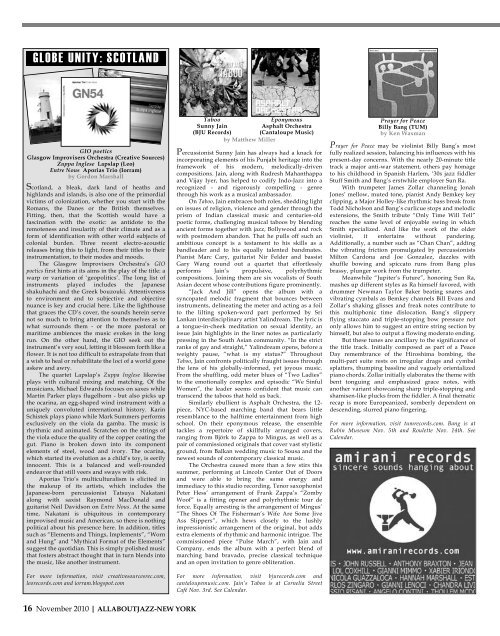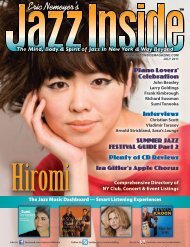AllAboutJazz-New York www.aaj-ny.com - Jazz Singers.com
AllAboutJazz-New York www.aaj-ny.com - Jazz Singers.com
AllAboutJazz-New York www.aaj-ny.com - Jazz Singers.com
You also want an ePaper? Increase the reach of your titles
YUMPU automatically turns print PDFs into web optimized ePapers that Google loves.
GLOBE UNITY: SCOTLAND<br />
GIO poetics<br />
Glasgow Improvisers Orchestra (Creative Sources)<br />
Zuppa Inglese Lapslap (Leo)<br />
Entre Nous Aporias Trio (Iorram)<br />
by Gordon Marshall<br />
Scotland, a bleak, dark land of heaths and<br />
highlands and islands, is also one of the primordial<br />
victims of colonization, whether you start with the<br />
Romans, the Danes or the British themselves.<br />
Fitting, then, that the Scottish would have a<br />
fascination with the exotic: as antidote to the<br />
remoteness and insularity of their climate and as a<br />
form of identification with other world subjects of<br />
colonial burden. Three recent electro-acoustic<br />
releases bring this to light, from their titles to their<br />
instrumentation, to their modes and moods.<br />
The Glasgow Improvisers Orchestra’s GIO<br />
poetics first hints at its aims in the play of the title: a<br />
warp or variation of ‘geopolitics’. The long list of<br />
instruments played includes the Japanese<br />
shakuhachi and the Greek bouzouki. Attentiveness<br />
to environment and to subjective and objective<br />
nuance is key and crucial here. Like the lighthouse<br />
that graces the CD’s cover, the sounds herein serve<br />
not so much to bring attention to themselves as to<br />
what surrounds them - or the more pastoral or<br />
maritime ambiences the music evokes in the long<br />
run. On the other hand, the GIO seek out the<br />
instrument’s very soul, letting it blossom forth like a<br />
flower. It is not too difficult to extrapolate from that<br />
a wish to heal or rehabilitate the loci of a world gone<br />
askew and awry.<br />
The quartet Lapslap’s Zuppa Inglese likewise<br />
plays with cultural mixing and matching. Of the<br />
musicians, Michael Edwards focuses on saxes while<br />
Martin Parker plays flugelhorn - but also picks up<br />
the ocarina, an egg-shaped wind instrument with a<br />
uniquely convoluted international history. Karin<br />
Schistek plays piano while Mark Summers performs<br />
exclusively on the viola da gamba. The music is<br />
rhythmic and animated. Scratches on the strings of<br />
the viola educe the quality of the copper coating the<br />
gut. Piano is broken down into its <strong>com</strong>ponent<br />
elements of steel, wood and ivory. The ocarina,<br />
which started its evolution as a child’s toy, is eerily<br />
innocent. This is a balanced and well-rounded<br />
endeavor that still veers and sways with risk.<br />
Aporias Trio’s multiculturalism is elicited in<br />
the makeup of its artists, which includes the<br />
Japanese-born percussionist Tatsuya Nakatani<br />
along with saxist Raymond MacDonald and<br />
guitarist Neil Davidson on Entre Nous. At the same<br />
time, Nakatani is ubiquitous in contemporary<br />
improvised music and American, so there is nothing<br />
political about his presence here. In addition, titles<br />
such as “Elements and Things, Implements”, “Worn<br />
and Hung” and “Mythical Format of the Elements”<br />
suggest the quotidian. This is simply polished music<br />
that fosters abstract thought that in turn blends into<br />
the music, like another instrument.<br />
For more information, visit creativesourcesrec.<strong>com</strong>,<br />
leorecords.<strong>com</strong> and iorram.blogspot.<strong>com</strong><br />
16 November 2010 | ALLABOUTJAZZ-NEW YORK<br />
Taboo<br />
Sun<strong>ny</strong> Jain<br />
(BJU Records)<br />
by Matthew Miller<br />
Epo<strong>ny</strong>mous<br />
Asphalt Orchestra<br />
(Cantaloupe Music)<br />
Percussionist Sun<strong>ny</strong> Jain has always had a knack for<br />
incorporating elements of his Punjabi heritage into the<br />
framework of his modern, melodically-driven<br />
<strong>com</strong>positions. Jain, along with Rudresh Mahanthappa<br />
and Vijay Iyer, has helped to codify Indo-<strong>Jazz</strong> into a<br />
recognized - and rigorously <strong>com</strong>pelling - genre<br />
through his work as a musical ambassador.<br />
On Taboo, Jain embraces both roles, shedding light<br />
on issues of religion, violence and gender through the<br />
prism of Indian classical music and centuries-old<br />
poetic forms, challenging musical taboos by blending<br />
ancient forms together with jazz, Bollywood and rock<br />
with postmodern abandon. That he pulls off such an<br />
ambitious concept is a testament to his skills as a<br />
bandleader and to his equally talented bandmates.<br />
Pianist Marc Cary, guitarist Nir Felder and bassist<br />
Gary Wang round out a quartet that effortlessly<br />
performs Jain’s propulsive, polyrhythmic<br />
<strong>com</strong>positions. Joining them are six vocalists of South<br />
Asian decent whose contributions figure prominently.<br />
“Jack And Jill” opens the album with a<br />
syncopated melodic fragment that bounces between<br />
instruments, delineating the meter and acting as a foil<br />
to the lilting spoken-word part performed by Sri<br />
Lankan interdisciplinary artist Yalindream. The lyric is<br />
a tongue-in-cheek meditation on sexual identity, an<br />
issue Jain highlights in the liner notes as particularly<br />
pressing in the South Asian <strong>com</strong>munity. “In the strict<br />
ranks of gay and straight,” Yalindream opens, before a<br />
weighty pause, “what is my status?” Throughout<br />
Taboo, Jain confronts politically fraught issues through<br />
the lens of his globally-informed, yet joyous music.<br />
From the shuffling, odd meter blues of “Two Ladies”<br />
to the emotionally <strong>com</strong>plex and episodic “We Sinful<br />
Women”, the leader seems confident that music can<br />
transcend the taboos that hold us back.<br />
Similarly ebullient is Asphalt Orchestra, the 12piece,<br />
NYC-based marching band that bears little<br />
resemblance to the halftime entertainment from high<br />
school. On their epo<strong>ny</strong>mous release, the ensemble<br />
tackles a repertoire of skillfully arranged covers,<br />
ranging from Björk to Zappa to Mingus, as well as a<br />
pair of <strong>com</strong>missioned originals that cover vast stylistic<br />
ground, from Balkan wedding music to Sousa and the<br />
newest sounds of contemporary classical music.<br />
The Orchestra caused more than a few stirs this<br />
summer, performing at Lincoln Center Out of Doors<br />
and were able to bring the same energy and<br />
immediacy to this studio recording. Tenor saxophonist<br />
Peter Hess’ arrangement of Frank Zappa’s “Zomby<br />
Woof” is a fitting opener and polyrhythmic tour de<br />
force. Equally arresting is the arrangement of Mingus’<br />
“The Shoes Of The Fisherman’s Wife Are Some Jive<br />
Ass Slippers”, which hews closely to the lushly<br />
impressionistic arrangement of the original, but adds<br />
extra elements of rhythmic and harmonic intrigue. The<br />
<strong>com</strong>missioned piece “Pulse March”, with Jain and<br />
Compa<strong>ny</strong>, ends the album with a perfect blend of<br />
marching band bravado, precise classical technique<br />
and an open invitation to genre obliteration.<br />
For more information, visit bjurecords.<strong>com</strong> and<br />
cantaloupemusic.<strong>com</strong>. Jain’s Taboo is at Cornelia Street<br />
Café Nov. 3rd. See Calendar.<br />
Prayer for Peace<br />
Billy Bang (TUM)<br />
by Ken Waxman<br />
Prayer for Peace may be violinist Billy Bang’s most<br />
fully realized session, balancing his influences with his<br />
present-day concerns. With the nearly 20-minute title<br />
track a major anti-war statement, others pay homage<br />
to his childhood in Spanish Harlem, ‘30s jazz fiddler<br />
Stuff Smith and Bang’s erstwhile employer Sun Ra.<br />
With trumpeter James Zollar channeling Jonah<br />
Jones’ mellow, muted tone, pianist Andy Bemkey key<br />
clipping, a Major Holley-like rhythmic bass break from<br />
Todd Nicholson and Bang’s curlicue stops and melodic<br />
extensions, the Smith tribute “Only Time Will Tell”<br />
reaches the same level of enjoyable swing in which<br />
Smith specialized. And like the work of the older<br />
violinist, it entertains without pandering.<br />
Additionally, a number such as “Chan Chan”, adding<br />
the vibrating friction promulgated by percussionists<br />
Milton Cardona and Joe Gonzalez, dazzles with<br />
shuffle bowing and spiccato runs from Bang plus<br />
brassy, plunger work from the trumpeter.<br />
Meanwhile “Jupiter’s Future”, honoring Sun Ra,<br />
mashes up different styles as Ra himself favored, with<br />
drummer <strong>New</strong>man Taylor Baker beating snares and<br />
vibrating cymbals as Bemkey channels Bill Evans and<br />
Zollar’s shaking glisses and freak notes contribute to<br />
this multiphonic time dislocation. Bang’s slippery<br />
flying staccato and triple-stopping bow pressure not<br />
only allows him to suggest an entire string section by<br />
himself, but also to output a flowing moderato ending.<br />
But these tunes are ancillary to the significance of<br />
the title track. Initially <strong>com</strong>posed as part of a Peace<br />
Day remembrance of the Hiroshima bombing, the<br />
multi-part suite rests on irregular drags and cymbal<br />
splatters, thumping bassline and vaguely orientalized<br />
piano chords. Zollar initially elaborates the theme with<br />
bent tonguing and emphasized grace notes, with<br />
another variant showcasing sharp triple-stopping and<br />
shamisen-like plucks from the fiddler. A final thematic<br />
recap is more Europeanized, somberly dependent on<br />
descending, slurred piano fingering.<br />
For more information, visit tumrecords.<strong>com</strong>. Bang is at<br />
Rubin Museum Nov. 5th and Roulette Nov. 14th. See<br />
Calendar.




